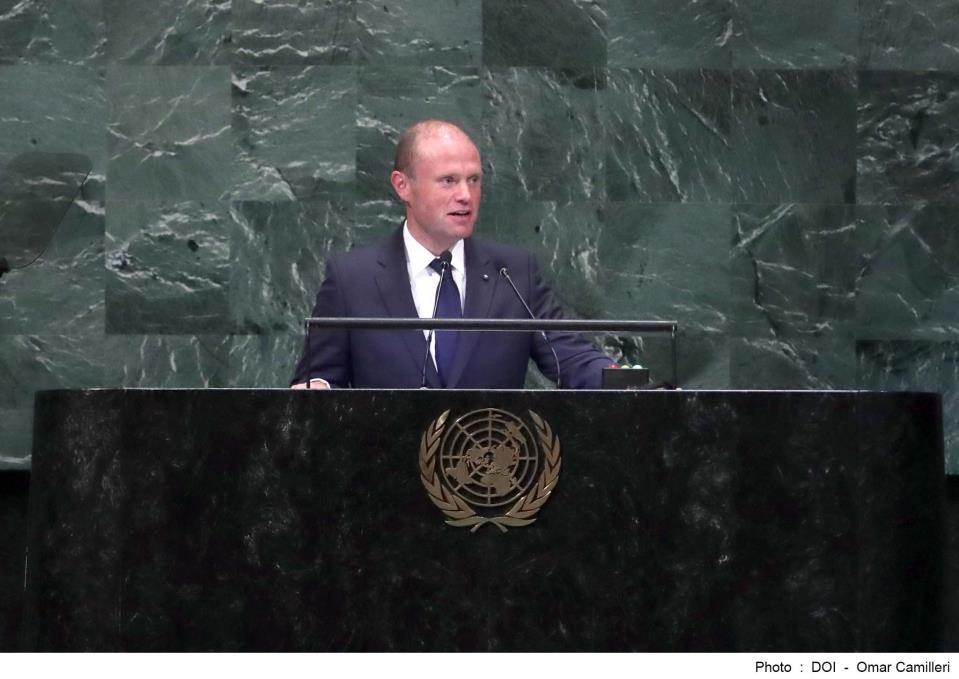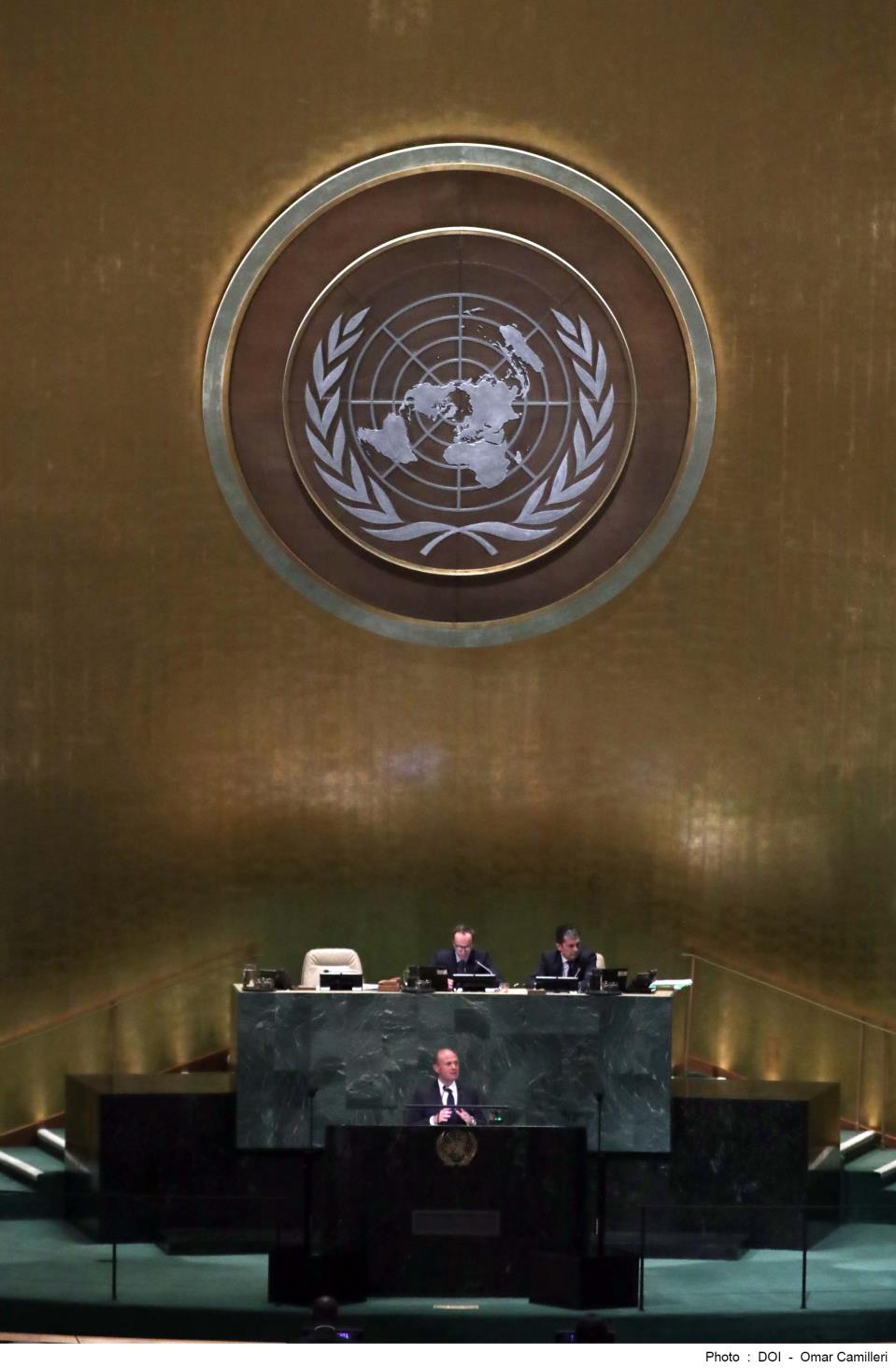Prime Minister Joseph Muscat used his annual speech to the United nations to mostly highlight migration issues, saying that a unified approach could stop criminal gangs profiting from smuggling human beings.
This is his full speech below:
"This summer we lost a great man: Kofi Annan. He stood for how we cannot achieve the United Nations’ goals without being united in our approach. Which is why I am here addressing you today: because I believe that global problems require global solutions. Advocating a global approach does not mean loving your country less than others. It means that working together makes it less likely that a ‘might is right’ doctrine will prevail. And better solutions can be found together, rather than alone.
To find solutions we must remain committed to communicate and understand one another. Because, whatever challenges we need to address, and however different each nation’s views and perspectives are, we have a better chance at solving them as a united force, rather than divided, or on our own.
Malta being a member of both the European Union and the Commonwealth knows only too well how no single nation, however big or small, cannot tackle global phenomena alone.
The trend of nations drifting towards reactions confined to their own borders is of concern. Some are worryingly looking at solving global issues with local solutions which, as many of you recognise, can at best give the illusion of working for a limited period of time, and at worst lead to almost immediate implosion.
Of course, we must respect the sovereignty of all nations, and we have no right to stand before you to judge. But those who are closing themselves off to debate are falsely believing they will escape certain issues. We are seeing divisions not just amongst global leaders and nations, but within our own societies, neighbourhoods, and even families. Local solutions breed global problems which can manifest themselves with devastating results.

From the use of plastic products which are polluting our seas to the point they are killing our sea life.
To mass migration and the effect of displacement on both migrants and host societies, where there are vulnerable people on both sides.
I mention these examples because both hit us particularly hard in Malta and in the Mediterranean. The latter is visible to all. We are in the centre of the Mediterranean, in the middle of the route between North Africa, Libya and mainland Europe. The centre of a journey, thousands of persons have undertaken over past years.
We have been grappling with all the complexities that this poses for years – much longer than it has been recognised as a priority by the international community, and dominating media headlines in Europe and beyond.
Although crossings through the Central Mediterranean have decreased in the past year, the concerns of our populations have risen. And many feel the international community has failed in providing solutions to these concerns. This has given rise to movements that preach a single, simplistic solution to a complex phenomenon.
What can surely be stopped if we have a unified approach, are the criminal gangs profiting from smuggling human beings.
With a global strategy to deliver incisive blows to migrant smugglers, we can disrupt their online recruitment efforts, their payment methods, as well as their continued supply of sea vessels: most importantly, we can, together, stop these people profiting from a practise that often results in the death of innocent people.
Malta is a small state which registers one of the highest economic growth in Europe and in the world, but also ranks among the highest worldwide in terms of the number of asylum applications per capita. Despite this, Malta’s humanitarian response continues to fully adhere to its international commitments. This is also true for Malta’s policy, which has been consistent and clear. And we expect others, not only States but also non-State actors involved, to also abide by international rules.
In recent weeks – because of the actions of a few who did not abide by the relevant conventions – Malta had to bring together like-minded nations with humanitarian consciences to offer a place of safety to stranded migrants. Malta had no legal obligation to do so, but in the spirit of unified solutions it did. And it proved that when solidarity works, complex issues can often have simple solutions.

Although I am under no illusion and know this was just a temporary respite to a much bigger problem, actions like these can provide the foundations for a longer-term solution if all European Union member states come together. A solution that could look like a Bretton Woods-styled institutional arrangement to address and manage migration, with international support.
The Global Compact on Migration, which aims to establish a new global migration governance architecture on the principle of shared international responsibilities and solidarity, is a welcome move in the right direction. But it is a milestone, not the end of the road. We must now walk the talk by engaging in operational action.
Mr President,
Narratives that use inflated or false facts, and thrive on the fear of a nation being open have led to painful outcomes in history. Not just the obvious, but also international relationship dynamics, which overflows into other issues with devastating results. The current increase in nationalism and tighter borders threatens to do just that, with democratic decisions potentially being hampered, feeding extremism of all kinds.
But let us take faith in knowing that in the 73 years of the UN’s existence, the going has always been tough. In fact, those who stood and spoke where I am today have faced much worse crises from wars, famines, injustice and killer diseases. But through unified approaches solutions were sought and nations survived. And each time we came together, we emerged stronger as an institution. We currently live in a world with less wars and more dialogue and cooperation than ever before.
But our work is not done. And it probably never will be. Although less people live in extreme poverty, it has not been eradicated. We have found solutions to many life-threatening diseases, yet cures are still needed for others. Injustice remains, and climate change could be the biggest threat to life in history. As we solve one issue, another will replace it. The important thing is we continue striving and working towards the greater good. But we can only do this together.
A way forward that Malta advocates is the harnessing of new technologies, which pose endless possibilities. We are currently in exciting technological times: with the lightening pace of current technological advance, each incredible piece of new innovation could hold a new solution to a problem we may have been persisting with for decades, from advanced robotics and artificial intelligence, to 3D printing and the Internet of Things.
Yes, there are challenges in this fast and obvious transition to the digital economy. These challenges have to do with the very nature of concepts that we have believed would stay with us forever. One of them is the nature of work, how we envisage it, how we compensate it, how we maximise its efficiency and how the state creates new safety nets. It is a conversation that has just started globally, but one that will shape public debate during our lifetime.
We can take the antagonistic view that technological progress is bad for us, that it will lead to new types of poverty, that it will outstrip people of their right, or even take decisions out of their hands. While this might sound appealing as a short term strategy for some politicians, and even sensible to well meaning people who are afraid progress will cost them their job, it would be as myopic as those advocating for horsecarts not to be replaced by motor vehicles.
Be it for immigration or technology solutions do not come from closing doors. The digital economy needs to be seen as an opportunity, without nevertheless thinking that we can best harness its opportunities without evolving the current social contracts in place.
Those who will be able to pair the digital economy with a new state, the digital state, will be best poised to have a futureproof society where change does not galvanise extremes, but provides for other decades of sensible, mainstream policymaking and prosperity.
Then there are the other big questions that the dawn of this digital age will need to see answered. Can we solve stalemate diplomatic negotiations by applying algorithms that can avoid war? Can we disarm terrorists using the latest technology? Is it possible to know immediately which remote parts of our planet need international humanitarian assistance assistance? Could we create new organs for people so no one dies on a donor list? Can we live the day when humanity can be told that there is a cure to all cancers?
Only time will tell. But it is the accessibility to advanced technologies that will lead to solutions. Hopefully for the whole world.
I passionately believe technology revolutionises and improves systems.
Which is why, in Malta, we have launched ourselves as the Blockchain Island by being the first jurisdiction to regularise a new technology that previously existed in a legal vacuum.
Blockchain makes cryptocurrencies, the inevitable future of money, more transparent since it helps filter good business from bad business. But these Distributed Ledger Technologies can do much more. It can provide new solutions to healthcare systems where patients have real ownership of their medical records. Emissions trading systems can be taken to the next level. We can help verify that humanitarian assistance is reaching its intended destination. We can make sure that nobody is deprived of their legitimate property because of compromised data. Corporations will be able to become more accountable to their shareholders. States will need to move from hoarding information on citizens to regulating an environment where citizens trust the handling of their data.
These are just few ways how we can counter regressive and reactionary politics.
This forum shows that we stand to gain through dialogue and cooperation which will always triumph over division, cynicism, and self-absorption.
Because, in unity we can have hope."